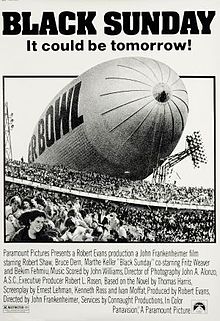Argo Bargo

The 2012 Argo. The movie did a terrible job on accuracy, if this is what it was supposed to be about.
I like talking about films, but I don’t really care for doing reviews, because by the time I’ve seen a movie, it’s probably already been out long enough for anyone who’s been planning on seeing it has already seen it. But when a relevant issue stands out to me, I like bring my perspective.
I finally watched Best Picture of 2012, Argo, earlier this week. It was a good film, probably not my favorite of the nominees I’ve seen (that honor probably goes to Les Miserables), but one I’d recommend to most people … with a caveat, of course.
In case you haven’t seen the film, Argo is about the Iran hostage situation in 1980, where some Iranian revolutionaries took over the U.S. embassy, taking the workers there hostage. Six Americans escaped and fled to the Canadian embassy. The CIA worked to get these six out of iran because they were afraid those six would be killed if they were found. So they collaborated with some people in Hollywood to create a fake movie and have those six pose as film crew to sneak them out.

Watch angry Palestinians try to blow up the Super Bowl! The remake was released last year, but it was called, “The Dark Knight Rises.”
As with any American film that has anything to do with the Middle East, you have to just go ahead and assume there’s going to be lots of racist crap there, and this film doesn’t disappoint! The viewer is afforded very little understanding as to why these Iranian citizens are upset at the Americans. The violent actions those people took are probably pretty true to life, so there’s no sugar coating that, but without the context as to why they are so angry, they are presented to the American viewer as the same savages we’ve been presented with time and time again, dating back to the 70s with movies like Black Sunday.
I understand that the film is not about them, it’s about the crazy plan the CIA used to free the hostages. But nearly every time Middle Eastern people (or any people south or east of Europe) are presented as rabid, angry, violent people, who we are made to assume are that way, possibly just because they live in the desert. They are basically treated like zombies with no true emotional or intellectual quality, other than that they are mad angry because they are.
Tangentially, Ben Affleck also cast himself as the figure in the main role, who in real life was Hispanic.
But in a time where a movie like Act of Valor came out in theatres just a few months ago, it’s just not socially responsible to continue to present foreigners in this manner. And where fellow Best Picture nominee Zero Dark Thirty presented torture of a Middle Easterner as important to our black ops war efforts. And the dozens of other movies over the years about the Gulf War. And where this guy who set fire to an Ohio mosque last year, said during his testimony that he believes that most Muslims are terrorists. He says most of the fuel for his actions came from Fox News, but you have to think that others are probably getting a lot of their news from TV and movies.
There are films out there that seem to explain a bit better the Middle Easterner’s condition like Paradise Now, (which you can apparently watch on YouTube in nine 10-minute parts) but I’m sure very few have heard of that. There’s also Three Kings, which at least demonstrates that Middle Easterners have a reason for being angry. Then, there are also plenty of films actually made in the Middle East that you could stream on Netflix that would show people from that area in a non-military context. Fancy that! They are really just people afterall.
Iran is now suing Hollywood on the basis that Argo is defamatory, malicious propaganda. Their case has no chance in hell of going anywhere. They want Argo to be taken off the market, for which I can sympathize with their plea. At the very least, I’d like to see something of a disclaimer at the beginning of the blu-ray explaining that these events are dramatized for the sake of making a dramatic movie. I know no one pays attention to those things, but it would at least be a show of respect for another culture, as well as history.
Despite my complaints, I enjoyed the film as a whole, as Alan Arkin and John Goodman are featured prominently throughout the first half, and the stuff they put on film is always a slice of fried gold. And it’s an interesting story.
I recommend the film, but keep in mind that Iranians are people, not the wild animals they’re depicted as in Argo.
“Argo fuck yourself!”

